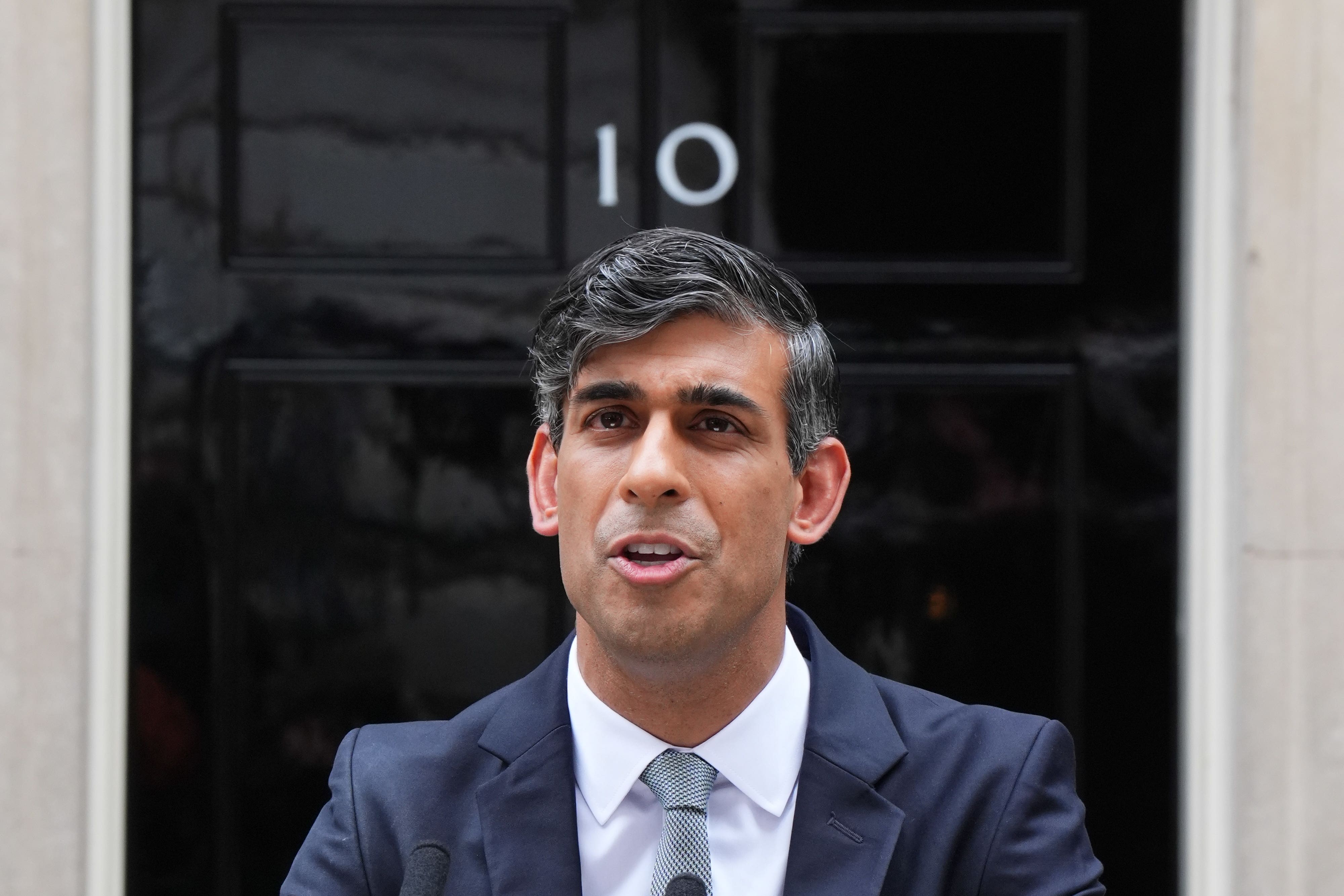Sunak apologises for Tory electoral disaster and confirms plan to quit as leader
Labour leader Sir Keir Starmer will be the UK’s new prime minister.

Rishi Sunak has apologised after leading the Conservatives to their worst ever election result as a Labour landslide swept Sir Keir Starmer to No 10.
The former prime minister said he would quit as Tory leader once arrangements are in place to choose his successor, potentially triggering another round of Conservative infighting as MPs scramble to replace him.
Sir Keir will become prime minister after a Tory rout which saw former premier Liz Truss and a dozen serving Cabinet members lose their seats.
In a statement outside No 10, Mr Sunak said: “I will shortly be seeing His Majesty the King to offer my resignation as Prime Minister.
“To the country, I would like to say first and foremost, I am sorry.
“I have given this job my all, but you have sent a clear signal that the Government of the United Kingdom must change. And yours is the only judgment that matters.
“I have heard your anger, your disappointment, and I take responsibility for this loss.”
After 648 of the 650 Commons seats had been declared, Labour had a majority of 176.
Labour had 412 seats and the Tories 121.
This is a difficult day at the end of a number of difficult days. But I leave this job honoured to have been your Prime Minister
Mr Sunak said: “Following this result I will step down as party leader – not immediately, but once the formal arrangements for selecting my successor are in place.“It is important that, after 14 years in government, the Conservative Party rebuilds, but also that it takes up its crucial role in opposition professionally and effectively.”
He added: “This is a difficult day at the end of a number of difficult days. But I leave this job honoured to have been your Prime Minister.
“This is the best country in the world. And it is thanks entirely to you, the British people, the true source of all our achievements, our strengths and our greatness.”
After speaking in Downing Street, Mr Sunak travelled by car to Buckingham Palace to resign as prime minister.
Buckingham Palace confirmed the King had accepted his resignation.
Sir Keir will go to see the King to accept the responsibility of forming a government.
It comes after a dramatic night:
– Ms Truss lost to Labour in Norfolk South West, where she had been defending a notional majority of more than 24,000.
– Twelve ministers who sat around the Cabinet table were ousted, comfortably exceeding the previous record of seven set in 1997.
– Commons Leader Penny Mordaunt, Defence Secretary Grant Shapps, Welsh Secretary David TC Davies, Transport Secretary Mark Harper, Attorney General Victoria Prentis and veterans minister Johnny Mercer lost to Labour.
– Education Secretary Gillian Keegan, Justice Secretary Alex Chalk, Science Secretary Michelle Donelan, Culture Secretary Lucy Frazer and Illegal Immigration Minister Michael Tomlinson lost to the Liberal Democrats.
– Chief whip Simon Hart lost to Plaid Cymru.
– Tory deputy chairman Jonathan Gullis and former cabinet minister Sir Jacob Rees-Mogg were beaten by Labour.
– But party chairman Richard Holden won by just 20 votes in Basildon and Billericay and outgoing Chancellor Jeremy Hunt held off a Lib Dem challenge in Godalming and Ash.
– Former Labour leader Jeremy Corbyn held on to his seat as an independent.
– Reform UK leader Nigel Farage won a Commons seat at his eighth attempt and promised his party would “stun all of you” as it picked up four Commons seats.
– The Greens also picked up four seats, including co-leader Carla Denyer defeating shadow culture secretary Thangam Debbonaire in Bristol Central.
– Shadow paymaster general Jonathan Ashworth, who played a prominent role in the party’s media campaign, lost his seat to an independent as Labour’s stance on Gaza cost them votes.
The Liberal Democrats achieved a record result, with 71 MPs.
Party leader Sir Ed Davey said: “We have swept to victory in seats from Land’s End to John o’ Groats.”
Reform received more than four million votes, around 600,000 more than the Liberal Democrats, but thanks to the first-past-the-post system they won just four seats.
Mr Farage will be joined in the Commons by former Tory Lee Anderson, party chairman Richard Tice and former Southampton FC chairman Rupert Lowe in being elected to Parliament.
After winning in Clacton, Mr Farage said there is now a “massive gap on the centre-right of British politics and my job is to fill it”.
But he added it is not just the Tories he is taking on, saying “We’re coming for Labour” and “This is just the first step of something that is going to stun all of you”.
In Wales, the Tories were wiped out, while in Scotland Labour was rampant.
First Minister and SNP leader John Swinney told the PA news agency: “We’ve got to face up to the realities of the situation that we are in and we’ve got to build the trust and the confidence of the public in Scotland.”
Outgoing Scottish Conservative leader Douglas Ross lost to the SNP’s Seamus Logan in Aberdeenshire North and Moray East.
In a sign that Sir Keir’s landslide may not have been driven by overwhelming public enthusiasm, turnout at the election was on course to be the lowest for more than 20 years.
After 648 of 650 results had been declared, the turnout figure stood at 59.85%, the lowest turnout at a general election since 2001.
Bookmark popover
Removed from bookmarks